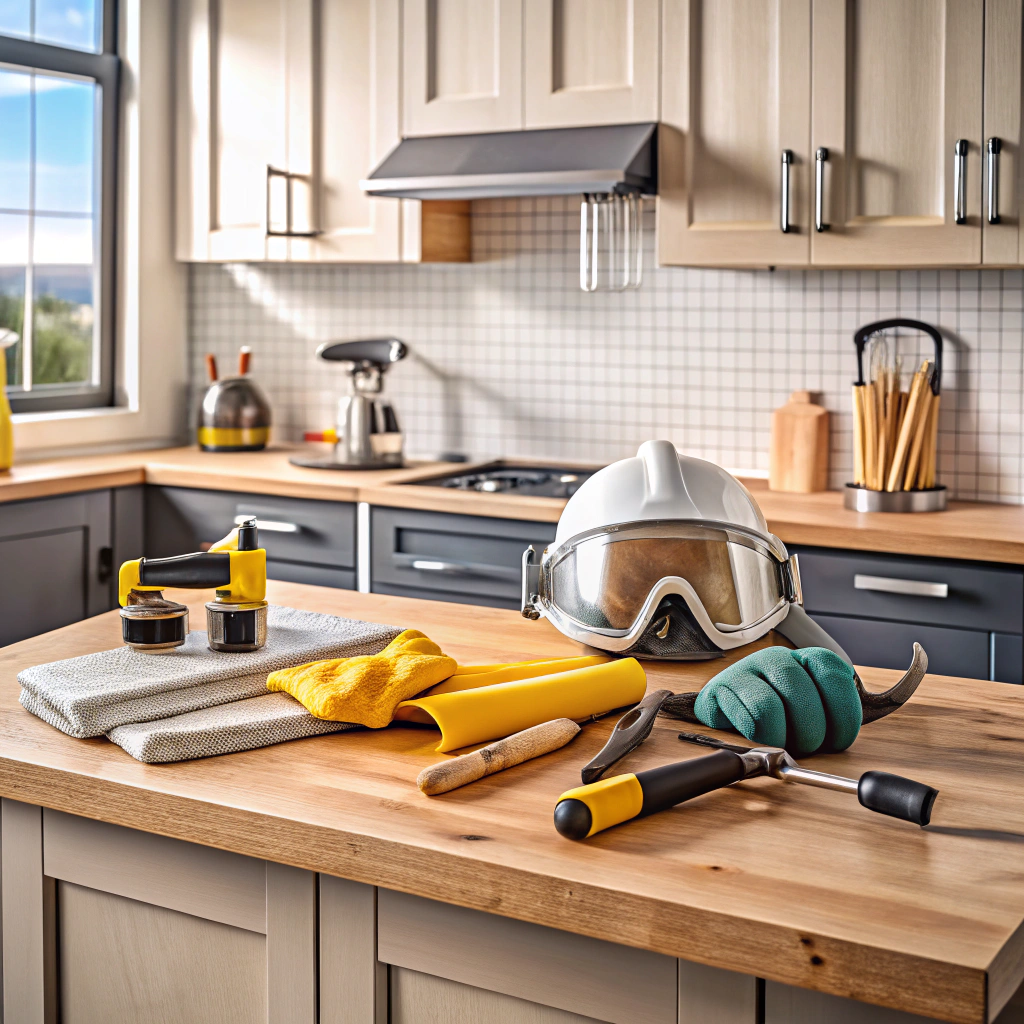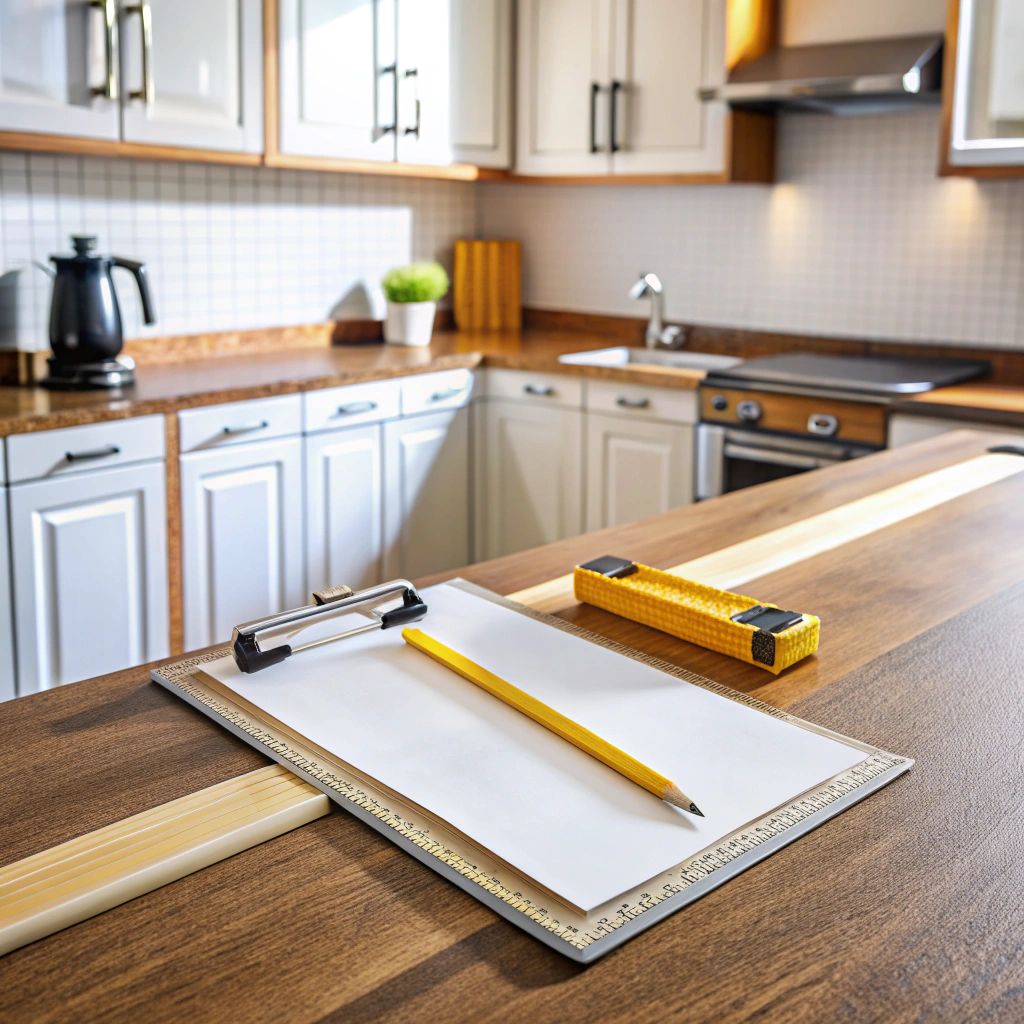Last updated on
Discover the common reasons behind that unpleasant sewage smell in your kitchen sink and learn effective ways to eliminate it for a fresher environment.
Have you ever walked into your kitchen and been hit with an unpleasant smell coming from your sink? If so, you’re not alone. A foul odor emanating from the kitchen sink can be a frustrating and embarrassing problem for homeowners.
Not only is it unpleasant to deal with, but it can also be a sign of a more significant issue that needs attention. In this article, we’ll explore the reasons behind why your kitchen sink smells like sewage and what you can do to fix it.
So, let’s get started!
What's Inside
Understanding Sewage Smell

Before we dive into the causes of sewage smell in your kitchen sink, it’s essential to understand what that odor is and where it comes from. The smell you’re experiencing is often described as a “rotten egg” or “sewage-like” odor.
This unpleasant scent can be caused by various factors, including bacteria buildup, clogs in the drain or pipes, and even issues with your water supply.
It’s important to note that while this smell may seem harmless at first glance, ignoring it could lead to more significant problems down the line. Not only can a persistent sewage odor be an indication of plumbing issues within your home but also pose health risks if left untreated.
Kitchen Sink Plumbing Basics
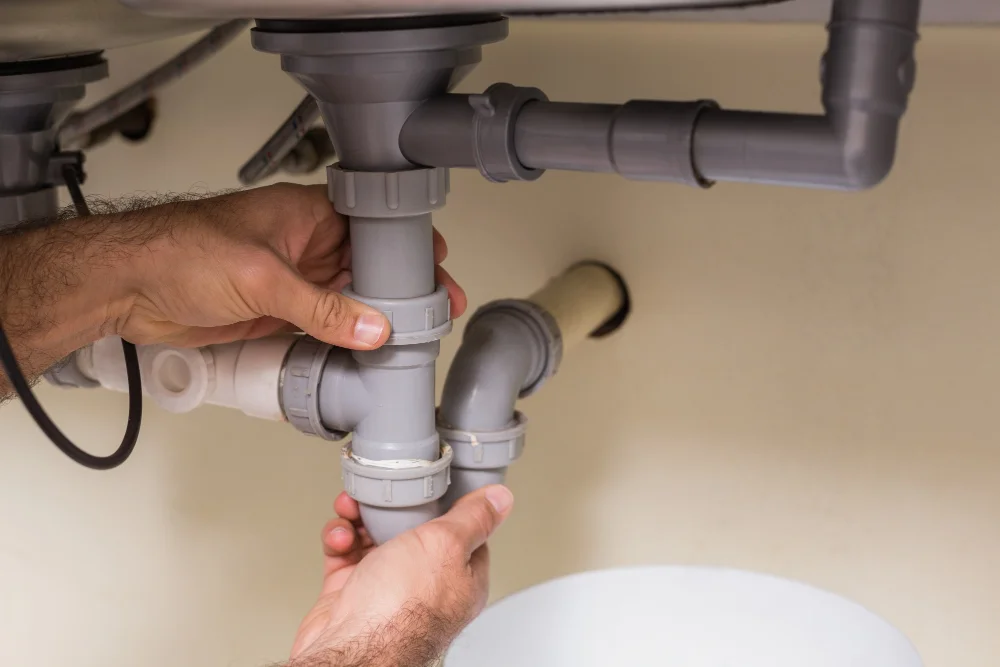
Understanding how this system works can help you identify the source of any problems, including sewage smells.
At its most basic level, your kitchen sink plumbing consists of two main components: the drain line and the supply line. The drain line carries wastewater away from your sink, while the supply line brings fresh water into it.
The drain pipe connects to a curved section called a P-trap before joining with other pipes in your home’s sewer or septic system. This trap holds some water at all times which creates an air seal preventing gases from entering back up through drains into living spaces.
Causes of Sewage Smell
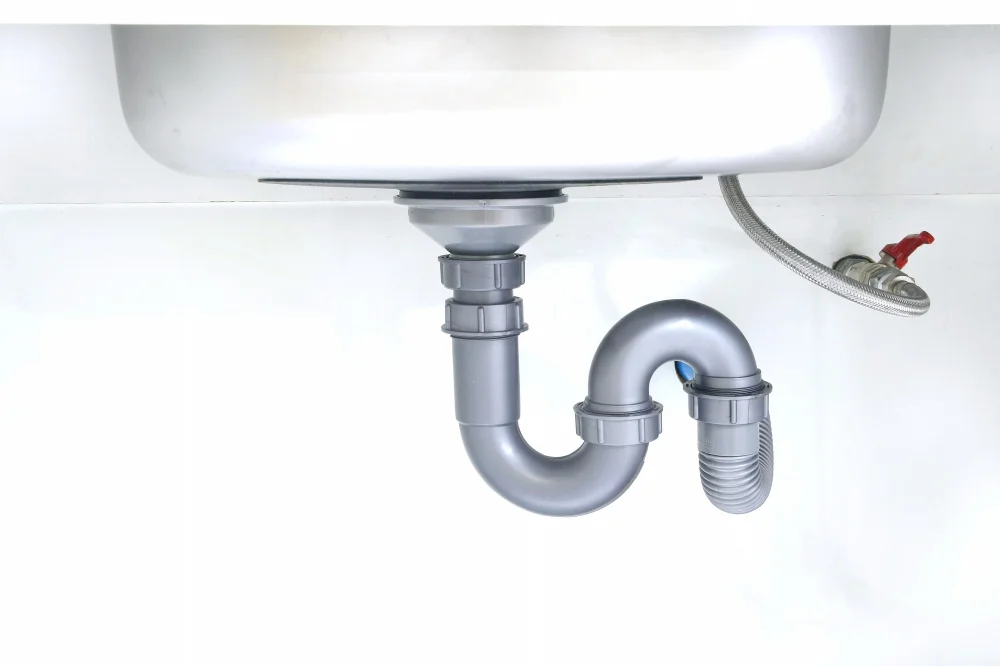
One of the most common causes is a blocked or dry P-trap. The P-trap is a curved section of pipe located beneath the sink that traps water and prevents sewer gases from entering your home.
If this trap dries out, it can allow odors to escape into your kitchen.
Another cause could be bacterial overgrowth in the drain or garbage disposal unit due to food debris buildup, which produces an unpleasant odor similar to sewage smell.
A clogged or cracked vent pipe can also lead to foul smells coming from your sink as it hinders proper air circulation in plumbing systems leading up through roofs.
Sewer line blockages caused by tree roots, grease buildup, and other debris may also result in backed-up pipes causing bad odors emanating from sinks throughout homes connected with these lines.
Identifying the Source
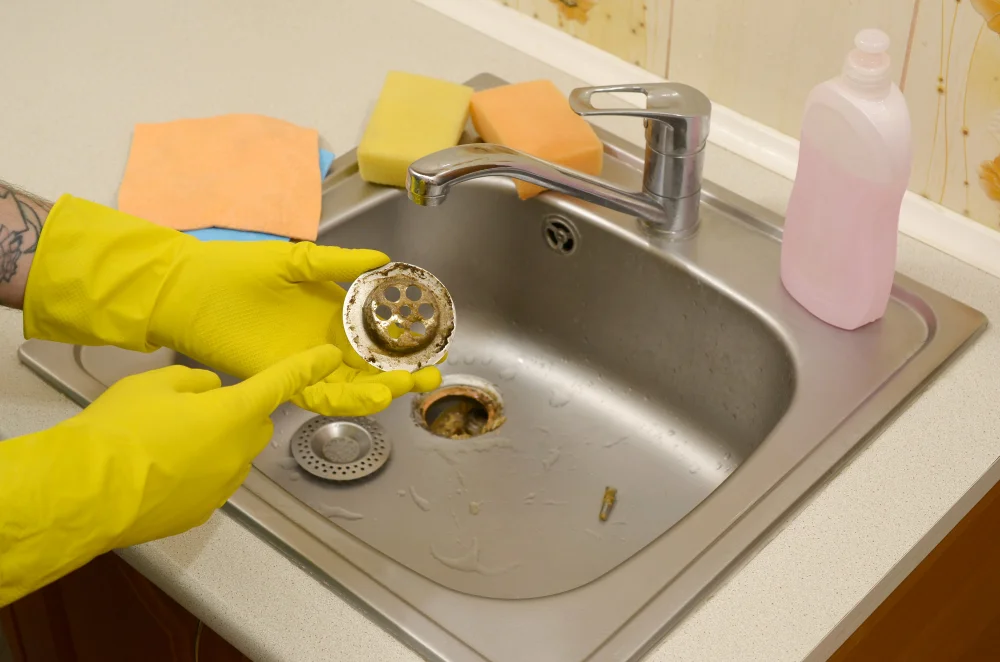
There are several potential causes, and each requires a different solution.
One common cause of sewer smells is a blocked or dry P-trap. The P-trap is located beneath your sink and traps water to prevent sewer gases from entering your home.
If this trap dries out or becomes clogged with debris, it can allow odors to escape into your kitchen.
Another possible culprit could be bacterial overgrowth in the drain pipes caused by food debris buildup that has not been cleaned properly. This bacteria produces hydrogen sulfide gas which gives off an unpleasant odor similar to rotten eggs.
A clogged or cracked vent pipe can also lead to foul odors coming from your sink as it prevents proper air circulation through plumbing systems leading up through roofs.
Blocked or Dry P-trap
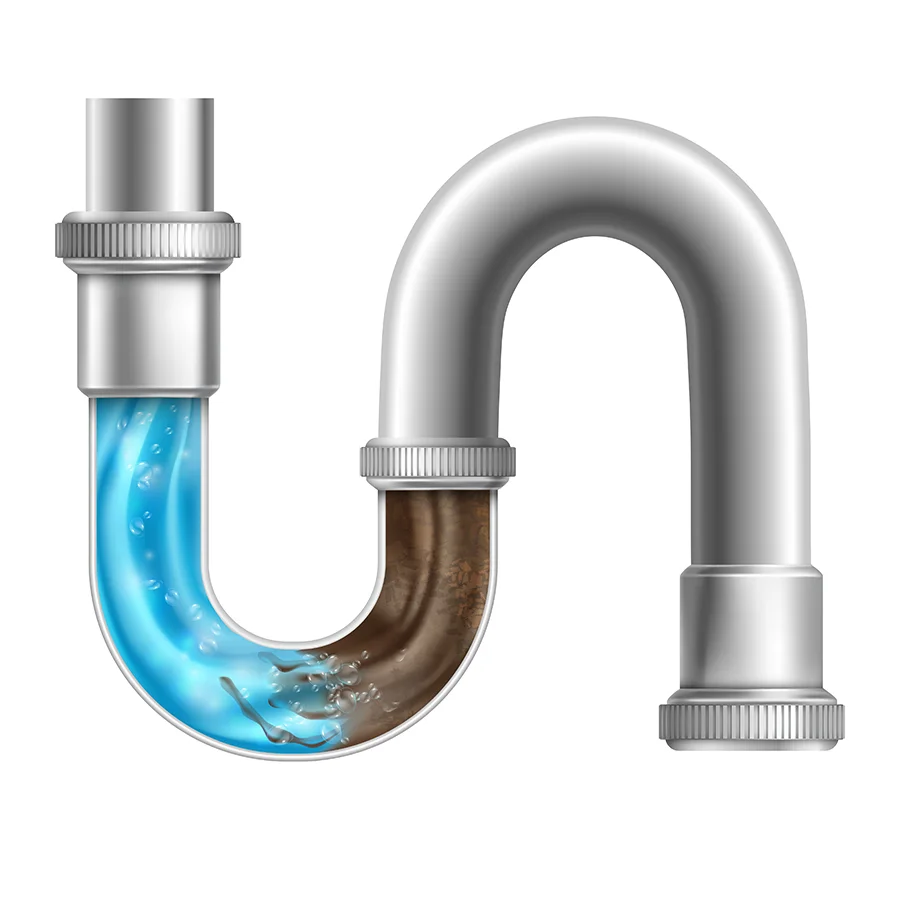
The P-trap is the curved pipe located under your sink that traps water and prevents sewer gases from entering your home. If this trap dries out, it can no longer block these gases, leading to an unpleasant odor.
A blocked P-trap can also cause problems as it prevents water from flowing freely through the drain. This blockage could be caused by food debris or other materials that have become lodged in the pipe.
To fix this issue, you’ll need to remove any clogs and ensure that there’s enough water in the trap to create an effective seal against sewer gas odors. You can do this by pouring some hot soapy water down into your drain regularly or running some tap water after each use of your sink.
Problems With Your P-Trap
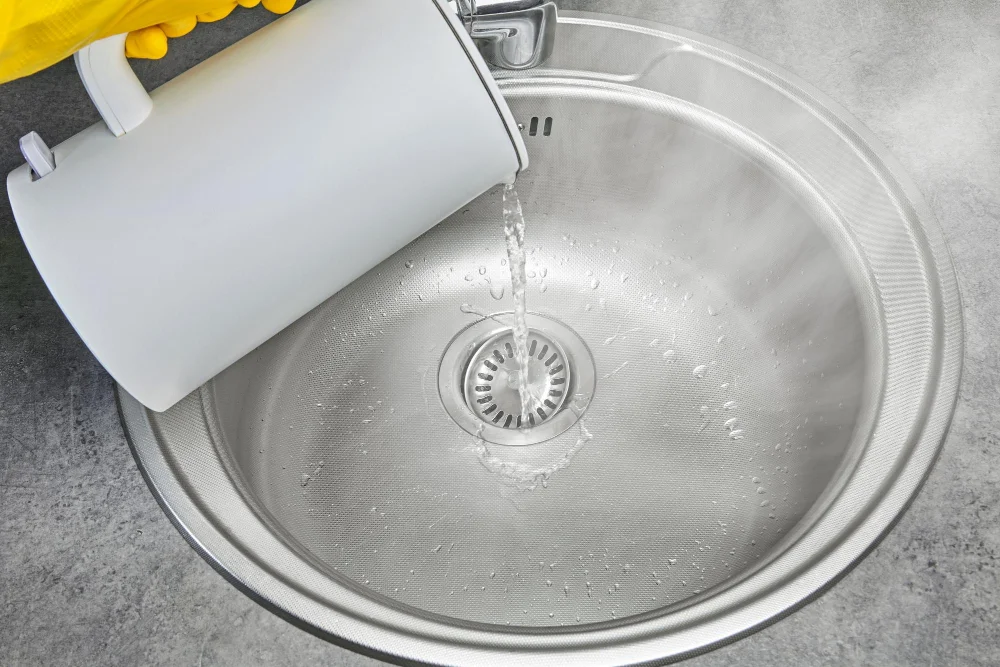
It’s designed to prevent sewer gases from entering your home by trapping water in the bend of the pipe. However, if there are problems with your P-trap, it can lead to an unpleasant sewage smell in your kitchen.
One common issue with the P-trap is that it may become dry due to infrequent use or evaporation. When this happens, there won’t be enough water present in the trap to block out sewer gases effectively.
To fix this problem, run some hot water down the drain for a few minutes or pour about half a cup of baking soda followed by vinegar into it and let sit for 30 minutes before flushing with hot water.
Another issue could be that debris has accumulated inside and blocked off proper drainage flow leading up to odors emanating from within its walls; cleaning out any buildup should solve this problem quickly.
Bacterial Overgrowth
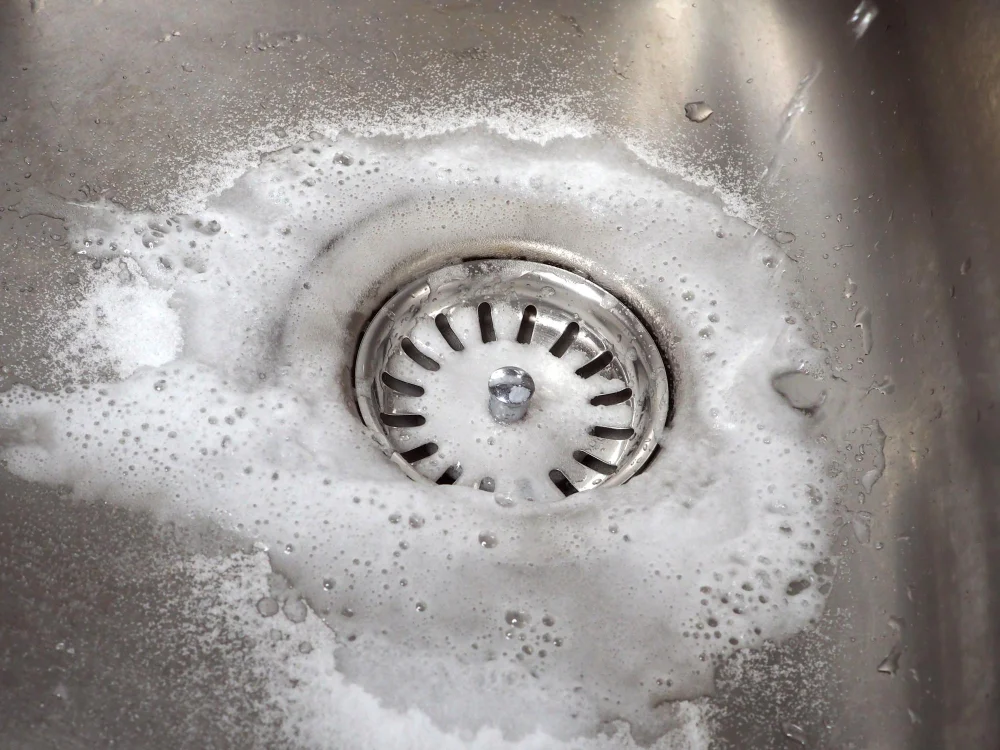
Bacteria thrive in moist environments, and your kitchen sink provides an ideal breeding ground for them to grow and multiply. When bacteria accumulate in your drain pipes, they can produce a foul odor that smells like sewage.
To eliminate bacterial overgrowth, you can use natural remedies such as pouring boiling water down the drain or using baking soda and vinegar to clean it thoroughly. You may also consider using commercial cleaning products specifically designed to kill bacteria.
Preventing bacterial growth requires regular cleaning of your sink drains with hot water or a mixture of baking soda and vinegar at least once a week. Avoid leaving food debris or grease on dishes before washing them as this creates an environment where bacteria can thrive.
Understanding the causes behind why your kitchen sink smells like sewage is crucial for maintaining good hygiene standards at home.
Clogged or Cracked Vent
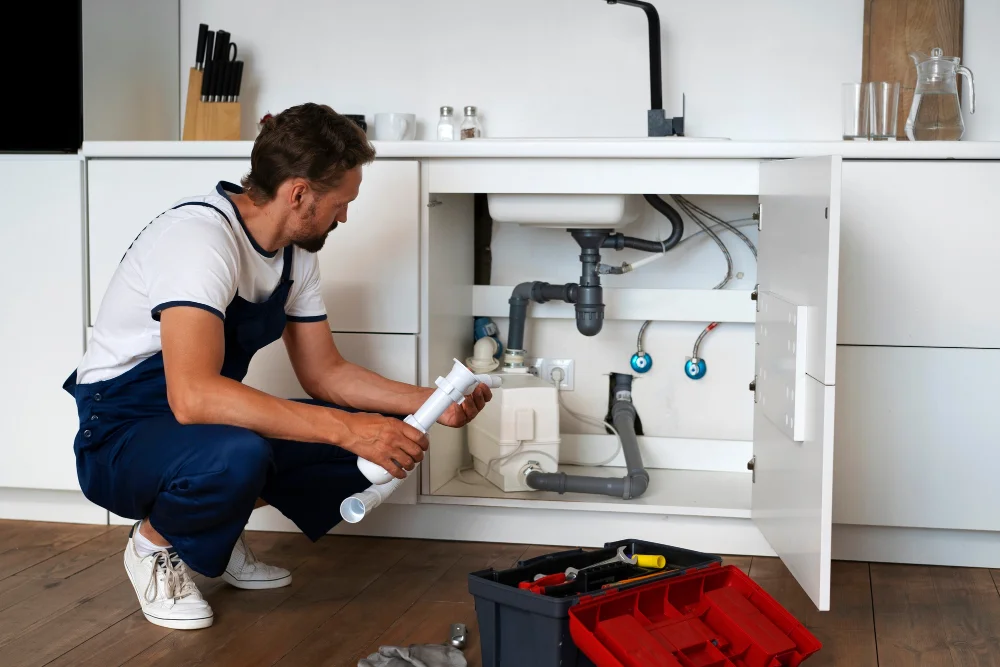
The plumbing system in your home has vents that allow air to flow through the pipes, which helps prevent blockages and allows wastewater to flow freely. If these vents become clogged with debris such as leaves, bird nests, or other objects, it can lead to slow drainage and unpleasant odors.
A cracked vent pipe can also be a culprit for the foul odor coming from your sink. A crack in the pipe could allow sewer gas into your home’s living spaces instead of outside where it belongs.
If you suspect that a blocked or damaged vent may be causing sewage smells from your kitchen sink, contact a professional plumber immediately for an inspection and repair. They will have specialized tools like drain snakes and cameras that they use to locate any blockages within the plumbing system quickly.
Sewer Line Blockage
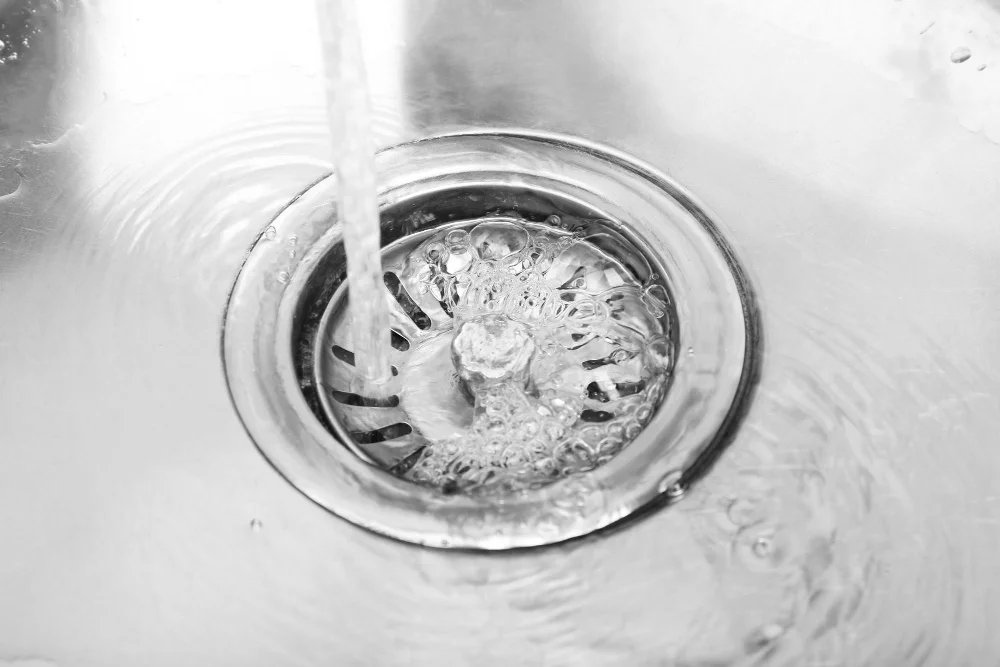
A blocked sewer line can cause wastewater to back up into your home’s plumbing system, leading to unpleasant odors.
A common sign of a sewer line blockage is slow drainage or gurgling sounds coming from other drains in the house. If you suspect that this may be the issue, it’s best to call in a professional plumber who can use specialized equipment like drain cameras and hydro-jetters to locate and clear any obstructions.
It’s important not to ignore signs of a potential sewer line blockage as it can lead to more significant problems down the road if left untreated.
Mainline Clogs
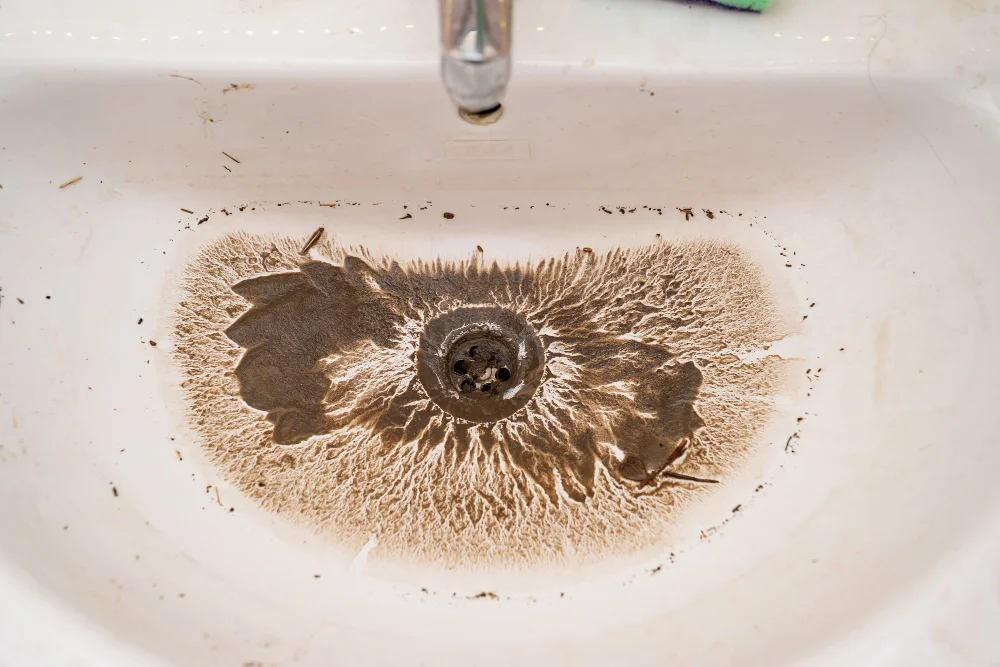
Mainline clogs are a serious issue and require immediate attention from a professional plumber.
A mainline blockage can cause wastewater to back up into your home, leading to significant damage and health hazards. Signs of a main sewer line blockage include multiple drains in your home backing up at once or gurgling sounds coming from the toilet when you run water elsewhere in the house.
In such cases, it’s best not to attempt any DIY fixes as they may worsen the situation. Instead, call an experienced plumber who has specialized equipment like drain snakes or hydro-jetting machines for clearing out stubborn clogs.
Food Debris in Drain
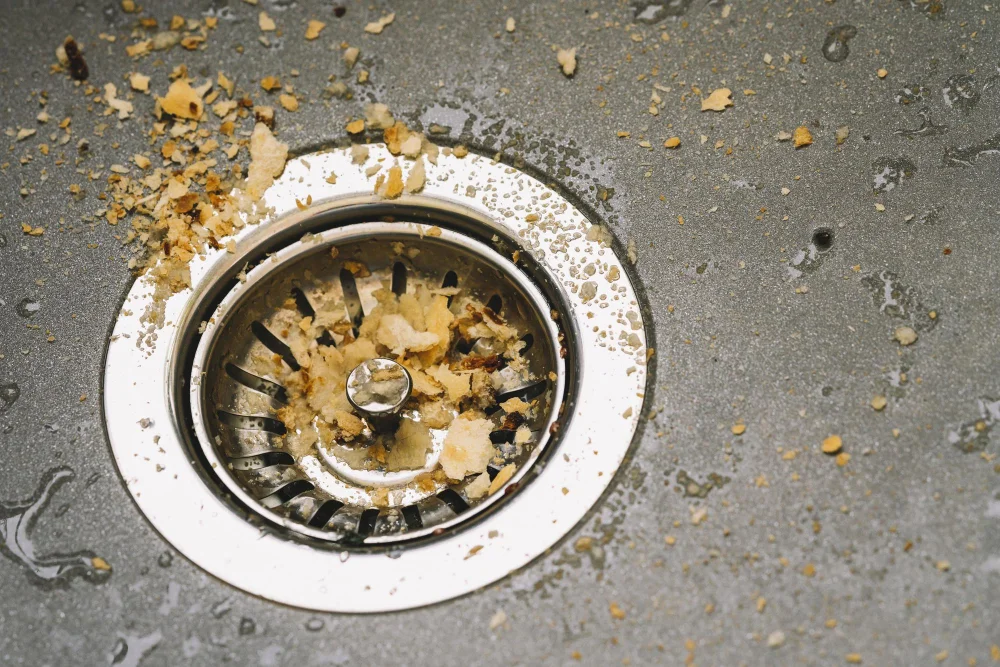
When food particles get stuck in the drain, they can start to rot and produce an unpleasant odor. This problem is especially prevalent if you have a garbage disposal unit installed under your sink.
To prevent this issue, it’s essential to be mindful of what goes down your kitchen sink. Avoid pouring grease or oil down the drain as these substances can solidify and clog up pipes over time.
Make sure that all food scraps are scraped into the trash before washing dishes or using the garbage disposal.
If you do notice an unpleasant smell coming from your kitchen sink due to food debris buildup, there are several things you can do to fix it. First off, try running hot water through the drain for several minutes while also turning on your garbage disposal unit (if applicable).
This should help break up any blockages caused by leftover food particles.
Clogs in the Drain
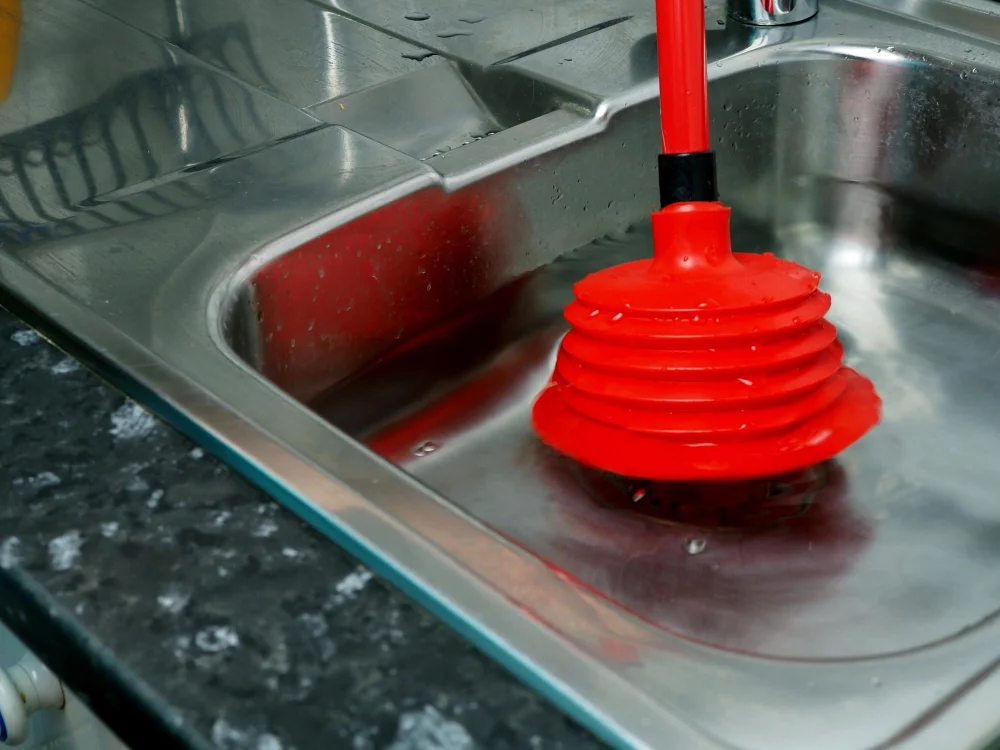
Over time, food debris, grease, and other substances can accumulate inside your pipes and cause blockages that prevent water from flowing freely. As a result, wastewater may back up into your sink and produce an unpleasant odor.
To fix this issue, you can try using a plunger or drain snake to remove any obstructions in the pipe. Pouring boiling water down the drain may also help dissolve any buildup that’s causing clogs.
However, if these DIY methods don’t work or if you’re dealing with persistent clogging issues despite regular cleaning efforts on your part; it’s best to call professional plumbers who have specialized tools like hydro-jetting equipment to clear out stubborn blockages effectively.
Preventing Clogged Drains:
The best way to avoid dealing with sewage smells caused by blocked drains is by taking preventative measures such as avoiding pouring grease down sinks or flushing non-degradable items like wipes down toilets. Regularly cleaning out drains using natural solutions like baking soda mixed with vinegar will also help keep them free-flowing while preventing bad odors from developing over time.
Garbage Disposal Issues
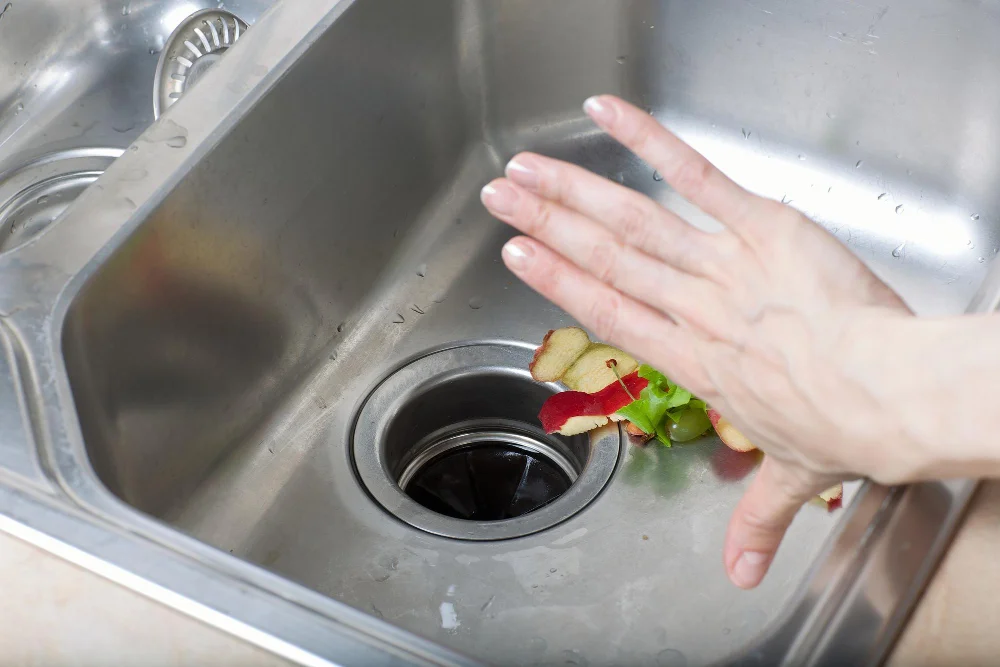
If your kitchen sink smells like sewage, it could be due to issues with your garbage disposal. Food debris and other waste can accumulate in the disposal unit over time, leading to bacterial growth and foul odors.
To prevent this from happening, make sure you’re using your garbage disposal correctly. Avoid putting large amounts of food waste down the drain at once and always run cold water while using it.
You should also clean your garbage disposal regularly by grinding ice cubes or citrus peels to help remove any buildup.
If you’ve already noticed an odor coming from your garbage disposal, there are several things you can do to eliminate it. Try pouring baking soda down the drain followed by vinegar and hot water for a natural cleaning solution that will break up any clogs or bacteria causing bad smells.
Leaking Pipes
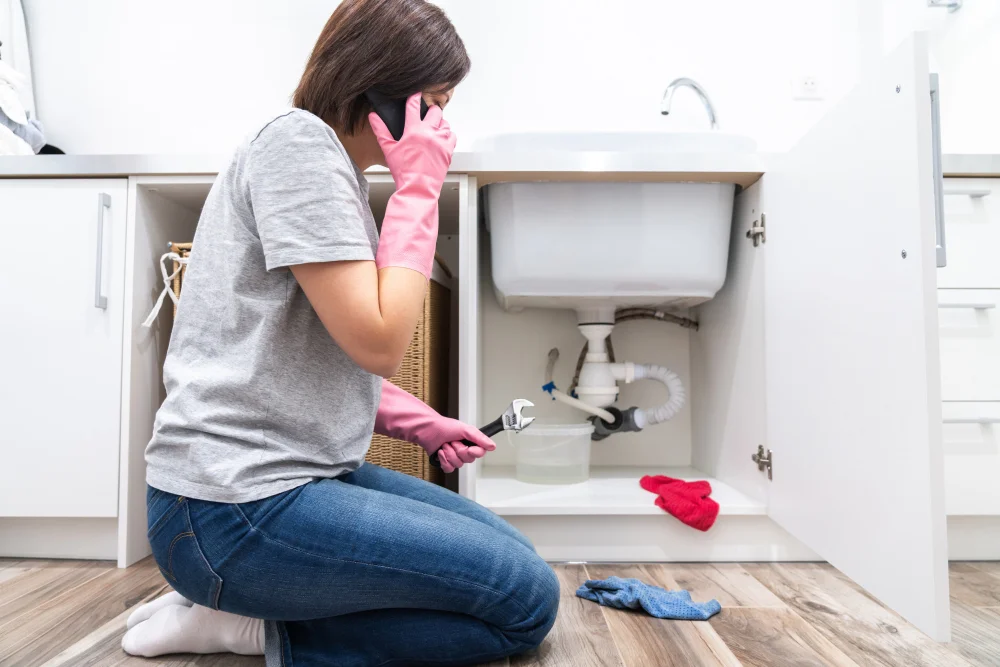
Over time, the pipes that connect to your sink can become damaged or corroded, leading to leaks and unpleasant odors. If you suspect that a leaky pipe is causing the smell in your kitchen sink, it’s essential to address the issue as soon as possible.
To determine if a leaking pipe is causing the problem, inspect all visible plumbing connections under and around your kitchen sink for signs of moisture or corrosion. You may also want to check for water damage on nearby walls or floors.
If you find any evidence of a leaky pipe, it’s best to call in a professional plumber who can assess and repair any damage quickly before it becomes more severe. In some cases where there are no visible signs of leakage but still have an odor coming from the drain; plumbers use smoke tests which help them identify hidden leaks within walls or underground piping systems.
Water Supply Contamination

If the water coming into your home contains high levels of sulfate, it can create a rotten egg-like odor that can be mistaken for sewage. Sulfate is naturally occurring in some groundwater sources and can also come from industrial waste or agricultural runoff.
To determine if sulfate is causing the smell, you may need to have your water tested by a professional. If high levels are detected, installing a filtration system or switching to an alternative source may be necessary.
It’s essential to address any potential issues with contaminated water as soon as possible since they pose health risks beyond just unpleasant odors.
Sulfate in the Water

Sulfates are naturally occurring minerals found in soil, rocks, and groundwater. They can also be present due to industrial waste or agricultural runoff.
When sulfates react with bacteria commonly found in drains and pipes, they produce hydrogen sulfide gas that smells like rotten eggs. If you notice a strong sulfuric odor coming from your kitchen sink when you turn on the tap or run water down the drain, it’s likely caused by high levels of sulfate.
To determine if this is indeed what’s causing your problem, have a professional plumber test your water for sulfate levels. If high levels are detected, installing a filter system may help reduce them and eliminate any unpleasant odors associated with them.
Preventing Sewage Odor
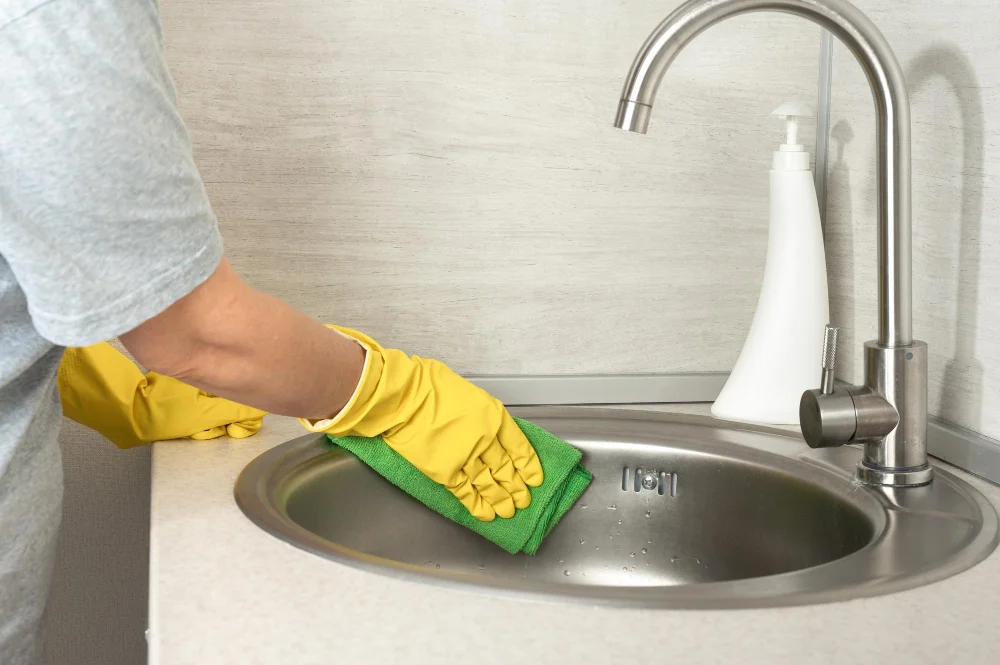
Here are some tips:
1. Keep your sink clean: Regularly cleaning your kitchen sink can help prevent bacterial growth and food debris buildup.
2. Run hot water down the drain: Running hot water down the drain after each use can help flush out any remaining food particles or grease that may have accumulated in the pipes.
3. Use a garbage disposal properly: Avoid putting large amounts of food waste into your garbage disposal at once, as this can cause clogs and odors.
4. Don’t pour grease down the drain: Grease solidifies when cooled, which means pouring it down a drain will eventually lead to blockages and unpleasant smells.
5. Schedule regular maintenance checks with a professional plumber: A licensed plumber can inspect for leaks or other issues before they become major problems.
Maintaining a Clean Sink
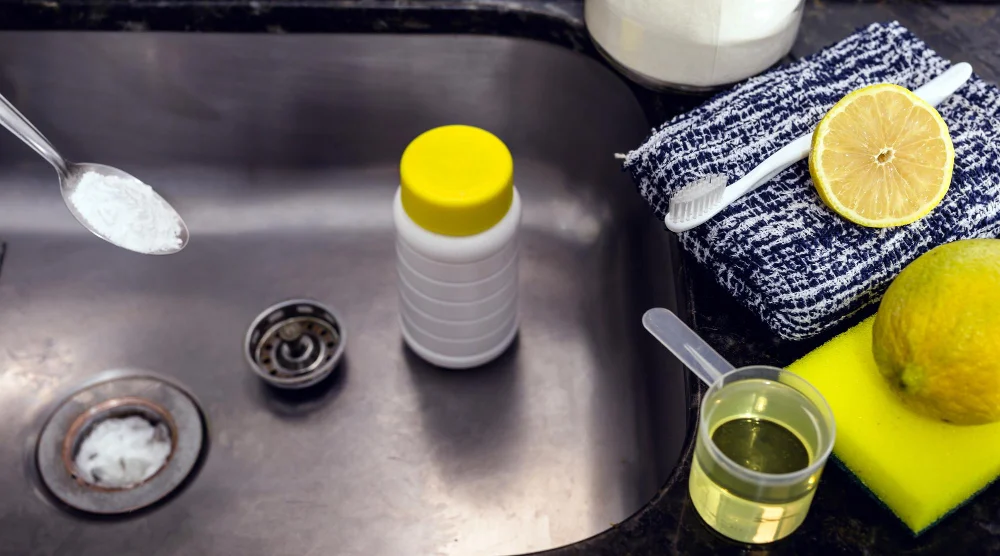
Food debris, grease, and other particles can accumulate in your drain over time and cause unpleasant odors. To keep your sink smelling fresh, make sure you rinse it thoroughly after each use.
You can also try pouring boiling water down the drain once a week to help break up any buildup that may be causing odor problems. Using baking soda and vinegar as an all-natural cleaning solution is another effective way to eliminate bad smells from your kitchen sink.
Regularly cleaning out food scraps from garbage disposals will also help reduce odors emanating from the kitchen sinks. Avoid putting fibrous or starchy foods like potato peels or celery into the disposal as they tend to clog drains leading to foul smells.
Regular Drain Cleaning
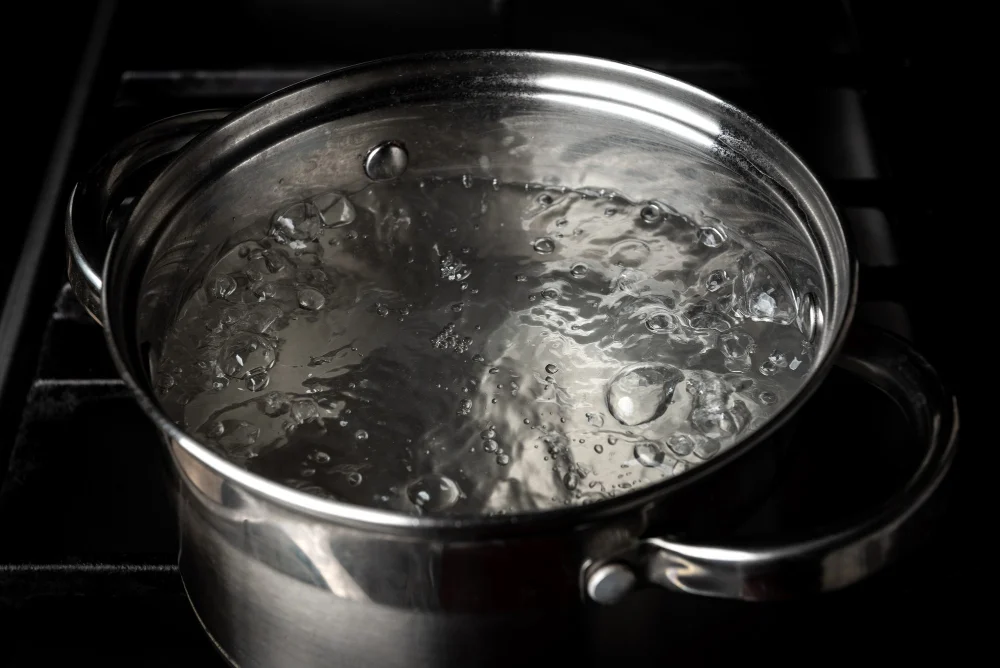
Over time, food debris, grease, and other substances can accumulate in the pipes and cause blockages that lead to unpleasant odors.
To keep your drains clean and odor-free, you should flush them with hot water at least once a week. You can also use natural drain cleaners like baking soda and vinegar or commercial products specifically designed for this purpose.
Another way to maintain clean drains is by using drain screens or stoppers that catch food particles before they go down the drain. This will help prevent clogs from forming in the first place.
Professional Solutions
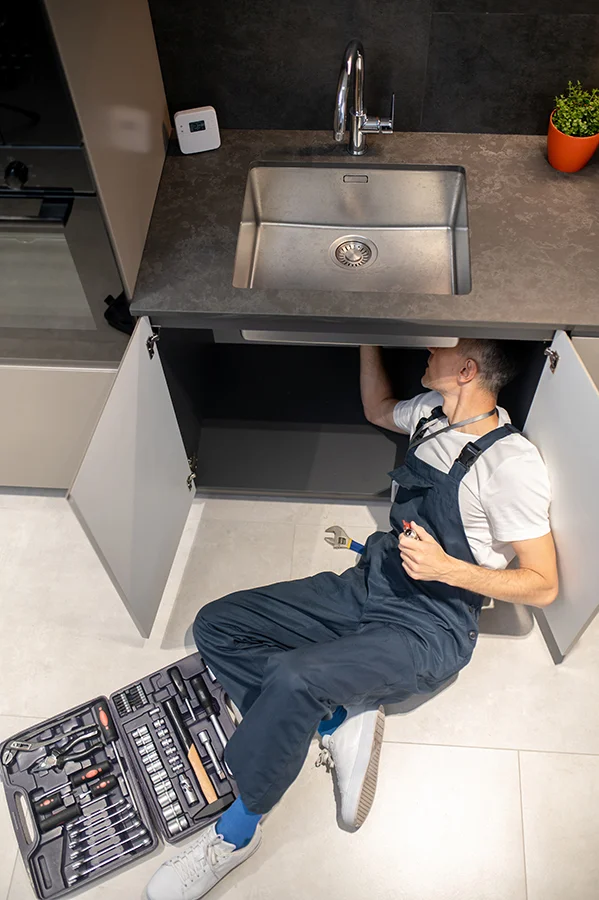
A licensed plumber has the expertise and tools necessary to identify and fix any underlying issues causing the odor. They can also perform a thorough cleaning of your kitchen sink drain system, ensuring that everything is working correctly.
Professional plumbers use specialized equipment such as video cameras or smoke tests to locate blockages or leaks in your plumbing system. Once they have identified the problem’s source, they will recommend an appropriate solution based on their findings.
In some cases, replacing damaged pipes or installing new ones may be necessary if there are significant problems with your plumbing system. However, most issues can be resolved through simple repairs like unclogging drains or fixing leaky pipes.
While calling in a professional plumber may cost more than attempting DIY fixes yourself initially; it could save you money over time by preventing further damage from occurring due to unresolved problems with your kitchen sink’s drainage system.
Remember always; prevention is better than cure! Regular maintenance checks by professionals help keep things running smoothly while avoiding costly repairs down the line.
FAQ
How do I get rid of sewer smell in my sink?
To get rid of sewer smell in your sink, pour one cup of baking soda and one cup of vinegar down the drain, let it sit for ten minutes, then flush with boiling water followed by cold tap water.
Why does my kitchen sink suddenly smell like sewage?
Your kitchen sink smells like sewage due to a clogged vent in your home’s plumbing system, causing improper air pressure and gas flow, leading to foul odors.
Why does my kitchen sink smell like septic tank?
Your kitchen sink smells like a septic tank because fats, oils, coffee grounds, and chemicals have disrupted sewage breakdown, causing a foul odor.
Can sewer gas come up the kitchen sink?
Yes, sewer gas can occasionally come up the kitchen sink, due to various factors such as drains, trapped food, bacteria, or high sulfate content in water.
What are the common causes of foul odors coming from kitchen sinks?
Common causes of foul odors from kitchen sinks include accumulated food particles, grease, and organic matter decaying in the drain and garbage disposal.
Are there any long-term solutions to prevent sewage smells in the kitchen sink?
Long-term solution to prevent sewage smells in the kitchen sink: Regularly clean and maintain the sink, using a combination of baking soda, vinegar, and hot water to remove debris and blockages that cause unpleasant odors.
How can I identify if the smell is coming from a plumbing issue or trapped debris in the sink?
To identify if the smell is coming from a plumbing issue or trapped debris in the sink, inspect the sink for visible debris and check for any water flow issues indicative of plumbing problems.


